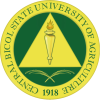The Central Bicol State University of Agriculture (CBSUA) officially began its groundbreaking project, “Agrivoltaic Farming: Optimizing Land Resources for Dual Harvest of Food and Energy,” with the successful conduct of its first team meeting, on September 24, 2025, at CBSUA Agriville and Learning Hub. This pioneering initiative, the first of its kind in the Philippines, blends agriculture with renewable energy, making land serve a dual purpose—growing food while generating clean power.
The project is jointly implemented by CBSUA and the Commission on Higher Education (CHED) under a shared responsibility framework. Through the 2025 CHED-Initiated Institutional Development and Innovation Grant (IDIG), funded by the Higher Education Development Fund (HEDF), CBSUA received ₱10 million in support for this ambitious venture. The total amount of project is ₱17,510,644.00 where ₱7,510,644.00 is the counterpart of CBSUA.
Present during the meeting was Dr. Dariel Palmiano, Vice President for Research and Innovations, who expressed strong support for the project. Dr. Palmiano emphasized the importance of aligning the initiative with the university’s research agenda and guided the team by suggesting the conduct of Laboratory Collaboration (LABCO) Workshops. These workshops, he explained, will strengthen interdisciplinary cooperation, provide specialized training, and promote innovation through shared resources and joint problem-solving.
The project roadmap, as discussed in the meeting, will unfold in five phases: the establishment of two agrivoltaic systems with supporting facilities such as solar-powered irrigation, hatchery, incubator, and processing unit; technical and social research; outreach to farmers’ cooperatives; integration into instruction and research; and finally, the development of IEC materials, intellectual property protection, and commercialization strategies.
The initiative is expected to generate 60 kW of peak solar power daily, making Agriville energy self-sufficient while sustaining key facilities. More importantly, it will provide faculty, students, and local farmers with hands-on experience in emerging agrivoltaic technologies, bridging academic research with real-world applications.
Guiding the project is a dynamic interdisciplinary team of CBSUA experts: Engr. Marife L. Pesino, PhD (Project Leader); Engr. Dulce Maria Abigail A. Jastio, MSc; Dr. Jayson M. Dañas, PhD; Buster A. Ibarbia, MSc; Dr. Glenn E. Redecilla, PhD; Engr. Harry King C. Avenido; and Francis Leo M. Lobenares. Their combined expertise in engineering, agriculture, gender development, commercialization, and farm management forms the backbone of the project.
CBSUA President Dr. Alberto N. Naperi commended the project team for their commitment to innovation, noting that the project aligns with several United Nations Sustainable Development Goals 2, 4, 5, 7, 8, 9, 12, and 13. “This is a bold step toward sustainable agriculture and renewable energy education. It demonstrates CBSUA’s capacity to lead in creating solutions that respond to both local and global challenges,” the President said.
With CHED’s funding support, CBSUA’s technical expertise, and strong leadership guidance, the Agrivoltaic Farming Project is envisioned to become a national model—a living example of how science, education, and community partnerships can converge to advance food and energy security for future generations. | 𝘙𝘦𝘱𝘰𝘳𝘵 𝘢𝘯𝘥 𝘱𝘩𝘰𝘵𝘰𝘴 𝘧𝘳𝘰𝘮 𝘖𝘝𝘗𝘙𝘐







